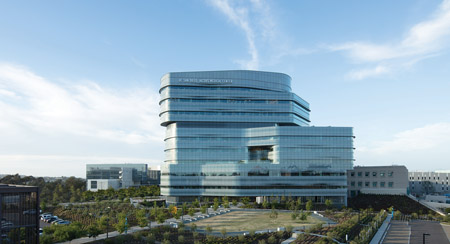A New and Dire Diagnosis: Human Trafficking
In the first-of-its-kind policy, all mandated reporters within UC San Diego Health will be responsible for reporting suspected victims of human trafficking
Published Date
By:
- Gabrielle Johnston, MPH
Share This:
Article Content
Starting in the fall of 2018, UC San Diego Health will be the first health system in San Diego County to implement a policy ensuring that all mandatory reporters are responsible for reporting cases of suspected human trafficking. This policy will be a coordinated effort of administrative and professional staff at all points of entry into the health system.
“Our new human trafficking policy will truly showcase UC San Diego Health’s commitment to help those most in need in our community,” said Patty Maysent, Chief Executive Officer at UC San Diego Health. “We are proud to be setting an example for other health systems across the county and hope policies like ours will become a common health care practice.”
The human trafficking policy will be supplemental to already existing state and federal laws that require mandatory reporters to come forward with concerns of suspected child abuse, abuse of dependent adults or elders and of suspicious physical injury. Emphasis is placed on staff being trained to recognize signs of human trafficking, while ensuring that safety and privacy are upheld. Key warning signs include:
- Physical trauma, such as bruises and cuts at various healing stages.
- Indicators that the patient is fearful of any accompanying person or lack of personal identification.
- Risk factors, like multiple sexually transmitted infections, pregnancies, abortions or miscarriages.
“Emergency departments are on the front line of being able to stop human trafficking,” said Ted Chan, MD, chair of the Department of Emergency Medicine at UC San Diego School of Medicine. “Our department is proud to be leading this effort, and to serve as an example and resource for other departments in the health system.”
When a potential human trafficking victim is identified, said Chan, the person will be escorted to a designated safe space where attending medical staff will begin to build a rapport with the patient. The idea is help the patient feel safe about answering questions. If responses suggest trafficking, the attending physician or charge nurse will notify local law enforcement.
As part of this policy, UC San Diego Health will be donating office space to local law enforcement to ensure a quick intervention.

Jacobs Medical Center at UC San Diego Health
Support for a medical policy stemmed from the San Diego County Advisory Council on Human Trafficking and Commercial Sexual Exploitation of Children. Research revealed that many victims of human trafficking intersect with the medical community during their victimization. The advisory council recognized the need to engage the medical community. As former chair of the advisory council, San Diego County District Attorney Summer Stephan committed her office to assisting UC San Diego Health in developing the medical protocol.
“We need the public’s help to recognize the signs that a person may be the victim of human trafficking,” Stephan said. “Health care professionals are in a unique position to detect red flags, to notice that something is not right, to ask questions and to alert law enforcement of their suspicions. The ability of a health care professional to intervene could be lifesaving. We want to make sure mandated reporters know as much as possible about this important responsibility so victims of sexual exploitation and abuse are protected.”
In San Diego County, its estimated 3,400 to 8,100 people are trafficked every year. Trafficking victims are typically female, 16 years, old on average, and from all ethnic backgrounds. Eighty-three percent are U.S. citizens. The UC San Diego Health policy defines human trafficking as the act of recruiting, harboring, transporting, providing or obtaining a person for compelled labor or commercial sex acts through the use of force, fraud or coercion.
If you suspect a victim of human trafficking or are a victim yourself, please call the National Human Trafficking Resource Center hotline, toll-free 24/7, at 888-373-7888 or text BeFree (233733).
About UC San Diego Health
UC San Diego Health, the region’s only academic health system, is dedicated to delivering outstanding patient care through commitment to community, groundbreaking research and inspired teaching. For 2018-19, U.S. News and World Report ranked UC San Diego Health among the nation’s best in six adult medical and surgical specialties, including pulmonology, geriatrics, cardiology, cancer, neurology and orthopedics. The 808-bed academic health system includes UC San Diego Medical Center in Hillcrest and Jacobs Medical Center, Sulpizio Cardiovascular Center, Moores Cancer Center, Shiley Eye Institute, Koman Family Outpatient Pavilion and Altman Clinical and Translational Research Institute, all in La Jolla, as well as primary care and same-day services at clinics throughout Southern California. For more information, visit health.ucsd.edu
Share This:
You May Also Like
Stay in the Know
Keep up with all the latest from UC San Diego. Subscribe to the newsletter today.



